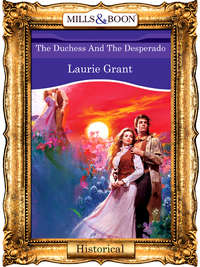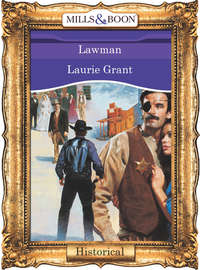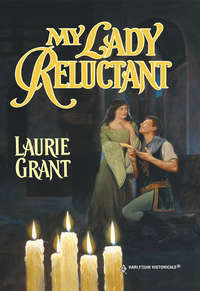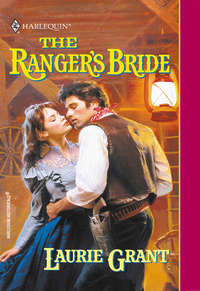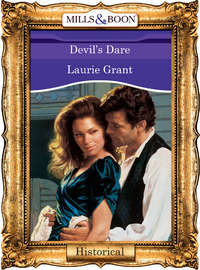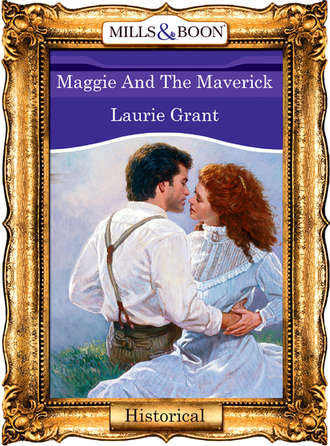
Полная версия
Maggie And The Maverick

Table of Contents
Cover Page
Excerpt
Dear Reader
Title Page
Books by Laurie Grant
About the Author
Dedication
Acknowledgment
Prologue
Chapter One
Chapter Two
Chapter Three
Chapter Four
Chapter Five
Chapter Six
Chapter Seven
Chapter Eight
Chapter Nine
Chapter Ten
Chapter Eleven
Chapter Twelve
Chapter Thirteen
Chapter Fourteen
Chapter Fifteen
Chapter Sixteen
Chapter Seventeen
Chapter Eighteen
Chapter Nineteen
Chapter Twenty
Chapter Twenty-One
Chapter Twenty-Two
Chapter Twenty-Three
Chapter Twenty-Four
Chapter Twenty-Five
Chapter Twenty-Six
Chapter Twenty-Seven
Chapter Twenty-Eight
Chapter Twenty-Nine
Copyright
“You can’t care for a man who isn’t whole.
“I won’t let you throw yourself away like that.”
Maggie blinked at the vehemence of Garrick’s words.
“You’ve seen me. You’ve seen my leg,” he went on, before she could deny his self-description. “I’ll be blunt, Maggie—can you really bear to think of that in your bed? Because that’s what it would mean, sooner or later, if we go on kissing and touching. I’m not a boy to be fobbed off with a few kisses and caresses in the moonlight, Maggie—I’m a man. And I’ll be damned if I’ll open my heart to another woman who’s going to run screaming from my bed.”
“I’m far from perfect myself, Garrick. And you are not your leg, Garrick. That is a part of you, yes, but when one loves, one loves the whole person. And there is much in you to love….”
Dear Reader,
Entertainment. Escape. Fantasy. These three words describe the heart of Harlequin Historical novels. If you want compelling, emotional stories by some of the best writers in the field, look no further.
Award-winning author and native Texan Laurie Grant has really hit her stride with Maggie and the Maverick, the last of her DEVLIN BROTHERS books. Garrick Devlin mistrusts women—with good reason: his wife left him when he came home wounded from the Civil War and she never told him she was pregnant. Now, trying to put a life together for his threeyear-old boy, he hires a newsman to help him start a paper. Only, M. L. Harper is really Maggie—a dainty Texas Yankee!—who wins his respect and shows him how to love again.
The Unlikely Wife by Cassandra Austin is a sparkling Western about a flirty, truly unlikely wife and the officer and gentleman who shows her what the love of a good man can do. Margaret Moore returns with The Welshman’s Bride, part of her WARRIOR SERIES, about a roguish nobleman and the shy lady he takes to wife, who prove that opposites do attract!
Be sure to look for Hunter of My Heart by talented newcomer Janet Kendall. In this fascinating, multilayered Regency, two Scottish nobles are bribed into marrying in an effort to protect their past secrets. Intrigue and passion abound from start to finish!
Whatever your tastes in reading, you’ll be sure to find a romantic journey back to the past between the covers of a Harlequin Historical® novel.
Sincerely,
Tracy Farrell
Senior Editor
Please address questions and book requests to:
Harlequin Reader Service U.S.: 3010 Walden Ave., P.O. Box 1325, Buffalo, NY 14269
Canadian: P.O. Box 609, Fort Erie, Ont. L2A 5X3
Maggie and the Maverick
Laurie Grant

Books by Laurie Grant
Harlequin Historicals
Beloved Deceiver #170
The Raven and the Swan #205
Lord Liar #257
Devil’s Dare #300
My Lady Midnight #340
Lawman #367
The Duchess and the Desperado #421
Maggie and the Maverick #461
LAURIE GRANT
combines a career as a trauma center emergency room nurse with that of historical romance author, she says living in two worlds keeps her sane. Passionately enthusiastic about the history of both England and Texas, she divides her travel time between these two spots. She is married to her own real-life hero, and has two teenage daughters, two dogs and a cat.
Laurie loves to hear from her readers. You can write to her at P.O. Box 307272, Gahana, OH 43230.
To Ann Bouricius and Carol McFarland, who between them coerced me into writing this book,
To Deborah Simmons, fellow Harlequin Hussy, who gave me the title,
To the determined and inspiring folk who make up the Amputee Coalition of America,
And to my own personal curmudgeon and hero, Michael.
ACKNOWLEDGMENT
I would like to thank Dale Starr, who works in the Print Shop at the Ohio Village, Ohio Historical Society, for his guidance in researching the newspaper industry in general and printing presses as they existed in frontier
America in the 1800s.
I would also like to thank Alvin C. Pike, certified prosthetist, President and Clinical Director of Amputee
Rehabilitation Services in Hopkins, Minn., and Ian Gregson, editor of Amputation Online Magazine, for their invaluable assistance in researching the history of leg prosthetics and in understanding the adjustments, both physical and psychological, that amputees must make.
Prologue
“It’s been very enjoyable, Maggie mine,” Captain Richard Burke told her, smiling regretfully as he rose from the horsehair sofa in front of the hearth. “But I’m afraid marriage is out of the question. You see…I have a wife back East.”
Even as her mind tried to process the words, Margaret Harper automatically noticed how handsome he looked in his uniform, his captain’s bars gleaming against the crisp dark blue. Richard Burke was an attractive man. And even now, as she began to comprehend the full horror of what he had just said, she still couldn’t rid her mind of the thought that he looked the very picture of a soldier.
“Y-you’re married?” Her lips, which still felt the taste of his passionate kiss, grew numb, and she could hardly form the words. “But you…but we’ve been courting-we’ve been lovers! How could you make me think. How could you say you loved me—when you…belonged to another?”
Richard sighed, smiled at her again and started to cup her chin in his hand, a gesture she had always found charming. Now she shrank from his touch. He had betrayed her! How could he think she would let him put his hands on her now?
“Ah, Maggie, who wouldn’t love you? Who could resist you? You’re an unusual woman, you know. Why, I’ve never met a female like you—a reporter, no less! And I wasn’t lying when I said I loved you. I do—in a way I’ll never love Beatrice, my wife. You understand me as she never could. And you’re so honest—”
“That’s certainly a virtue you can’t claim, isn’t it, Richard?” she snapped, ignoring the pain that sliced through her like a cavalry saber. She slapped his still-extended hand away and jumped to her feet. “Don’t you dare touch me, you—you cur! Get out!”
But Richard Burke gave her another of his coaxing smiles. “Now, Maggie, let’s not be so hasty. Boston is hundreds of miles away, and what you and I found together was very…special to me. I believe it was to you, too. Surely we can just go on as we’ve been? You’d miss my loving, wouldn’t you? I know I’d miss touching you, kissing you—”
“You bastard,” she hissed. “I’d feel contaminated if your shadow ever again so much as crossed mine. I told you once to leave, and I meant it. Now get out, or I’ll call my father.”
“Margaret, I wouldn’t do that if I were you,” Burke retorted silkily. “Would you really like him to know why you’re upset? Do you really want your dear papa to know his innocent daughter is innocent no more? You know, I never expected you to be a…to be untouched, the way you smiled at me.”
“Damn you, Richard Burke,” she said between clenched teeth, feeling her hands curl into claws and fighting the urge to launch herself at him and rake that handsome face. “Damn you to hell!”
“Now, now, I’ve always admired your fiery temperament, m’dear—it goes with that red hair—but a lady doesn’t curse. But then, a lady doesn’t soil her hands in printer’s ink, either, does she? Can you wonder that I thought you a woman of the world?”
She wasn’t aware of her hand closing around the delicate little figurine on the end table beside the couch; she didn’t know she had picked it up until it shattered against the wall just an inch or two above Burke’s head.
He flinched as shards of porcelain rained around him, and after one last reproachful look, beat a hasty retreat out the door.
From above, Maggie heard her father call, “Is anything amiss, Margaret? I thought I heard a noise. Did something break?”
“Everything’s all right, Papa,” she called back, hoping he did not hear the shakiness of her voice. “Mr. Burke was just leaving, and I’m afraid I accidentally knocked the little china ballerina to the floor and broke it.”
“Oh, is that all? Too bad, but I thought you were hurt. Tell Mr. Burke goodbye for me—and why not invite him to Sunday dinner?”
The only place I’ll invite him to go is straight to hell, Papa. Then she realized she’d better clean up the damage before she had to explain why the remains of the figurine were lying scattered on the braided rug next to the parlor door rather than next to the end table. She knelt and, holding up her skirt to form a pocket, began dropping the broken pieces into it.
How could she have been so foolish? she wondered, as tears began to blind her eyes to the task. How could she have trusted Richard Burke so completely when he said he loved her, in spite of the still, small voice inside her that said it was too soon, that words of admiration and love came too easily to the Yankee captain’s mouth? This is what you get for ignoring that warning, whether you call it conscience or an angel’s voice, she told herself fiercely. You deserve this heartache, because your instincts told you Richard Burke was too good to be true, and you didn’t believe them.
He’d sworn they’d be married just as soon as they could arrange it, but he’d begged to be allowed to make love to her sooner. He was on fire for her, he’d claimed that night about a month ago, when he’d come calling. Her father had been working late at the newspaper office, and she’d known better than to let Richard in, but he’d coaxed her and teased her until she’d done so.
He’d begun his seduction as soon as the door had closed behind him. She’d surrendered to him that night, and he’d kissed away her tears from the pain of losing her virginity. He’d told her she was magnificent, that he loved her, and he’d renewed his promise that they’d soon be married.
She had passed the next weeks in a sensual haze, stealing out to meet him several times a week. She’d neglected her duties as one of her father’s chief reporters for the newspaper that served both the occupying troops and the horde of profiteers that had descended on conquered Texas.
Richard had tutored her in the ways of sexual pleasure-always calling it love, of course. He hadn’t mentioned marriage again, and whenever she tried to, he’d adroitly distracted her.
Tonight she’d been determined that they should settle on a date and, after a few kisses, had told him smilingly but firmly that she wanted to plan their wedding.
Then he had told her about the wife in Boston. He had never meant to marry Maggie, of course. She had just been a pleasurable distraction to him while he served with the federal occupation troops in Austin.
And now she was ruined. It was entirely possible she could be carrying his child. And even if she escaped that disastrous consequence, there was nothing to stop Richard from boasting of his conquest to the entire regiment.
Fool! her brain screamed as tears began to flood down her cheeks. Blindly, she reached for a piece of the porcelain ballerina’s arm and gasped as a needle-sharp sliver of china slid into the tender flesh of her fingertip.
The pain was the last straw. Collapsing against the wall, the pieces of porcelain still cradled in her skirt, she began to sob in earnest.
Chapter One
Bryan, Texas, January 1869
The stage was late. That was nothing new—it was always late—so the fact that it hadn’t arrived by noon, as scheduled, wasn’t what had Garrick Devlin fidgeting on the bench seat outside the Bryan Hotel, where the stagecoach always unloaded its passengers and their baggage. No, it was the thought of who was on the stage that had him checking his pocket watch every few minutes, raking a hand through his hair, then reaching into his pocket for his comb to repair the damage his fingers had done.
She had given him that carved-ivory comb, he remembered, for their first Christmas together as husband and wife. It was during the middle of the war, when finding money to spare for gifts and celebrations had been difficult. He had been home on leave from his regiment, so glad to be away from the sounds of shelling and the constant threat of death that he was sure his little corner of Texas was heaven itself. Of course, that leave had been two years before the minié ball had shattered his right leg just below the knee. When he had awakened in the field hospital to find out the army surgeon had amputated what was left of his lower leg, Garrick knew that heaven was just a fable. It didn’t exist.
And now she was coming back, according to the letter she’d sent. Cecilia, the wife who had once loved him enough to save her scarce pennies to buy him that comb for Christmas. The same woman who had fled in horror the morning after he had come home from the war, hobbling on crutches, his right trouser leg pinned up so it wouldn’t flap in the breeze.
Hell, he wished he was a whole man so he could get up and pace. But he was damned if he’d give the old graybeards loitering across the street in front of the saloon a show. He despised his awkward, dragging gait, even now that he’d gotten the wooden leg made by the Hanger Company and he’d been able to abandon the hated crutches in favor of a cane.
It seemed he was not to escape their attentions, however, for a moment later one of them came shuffling across the street and hailed him.
“Howdy, Garrick. Mighty fine day fer January, ain’t it?”
“I suppose so,” he muttered, wishing the old man would take the hint and go away.
“Yore gittin’ around mighty fine, mighty fine indeed, yessir,” the old man said approvingly, nodding in the direction of Garrick’s wooden leg. “Y’kin be right proud.”
Right proud that a seventy-year-old man walked with more grace than he did? Garrick purposely leveled a look at the old man that would have frozen a Texas lake in midJuly. “I’m afraid you’ll have to excuse me, sir,” he said. Maybe if he disappeared into the hotel for a few minutes the old man would go back across the street to rejoin his cronies.
However, just then the distant sound of galloping horses and creaking wheels announced the coming of the stage.
“Yore meetin’ the stage?” inquired the old man, apparently unaffected by Garrick’s glare. “Who’s comin’ t’visit? Anyone I know?”
There was no way Garrick wanted the likes of this elderly busybody present in the first moments of his reunion with Cecilia. He prayed for the ground to open up and swallow the garrulous old fool, but it seemed God wasn’t listening to such mundane requests today.
He shoved a hand in his pocket and came out with a coin. “Here’s two bits,” he growled. “Go and buy yourself a drink, okay?”
The old man cackled, acknowledging that he was being bought off, then retreated to other side of the street just before the stagecoach rounded the corner.
This was it, Garrick thought, as the stagecoach driver reined in his team in a cloud of dust in front of the hotel. In a moment or two he’d be face-to-face with his wife, the woman who had once fled his home and his bed. What had caused her to write him and say she was coming home again now, after being gone more than three years?
Lord, he wanted to believe it was because Cecilia had discovered she loved him—loved him enough to realize she’d done wrong by running away, loved him enough to come back and be a wife to him. He knew it was hard to look at him—a man who, was not whole anymore, whose right leg ended in a clumsily closed stump right above the knee—but if they truly loved one another, they could work their way past that, couldn’t they?
Then the stagecoach door was being thrown open and Garrick’s heart seemed to surge into his throat, choking him with its runaway rhythm. A man stepped out and turned to assist a lady behind him.
Cecilia? No, the woman was black haired, not blond like Cecilia, and from the tender look she and the man exchanged, it was probable they were married. Then another man exited, a drummer by the looks of him, and then, finally, a woman appeared.
It was not Cecilia. The woman was elderly, with gray hair and a lined, pinched face, and she was holding the hand of a small boy.
Alarmed, Garrick looked behind her, hoping that the cramped, shadowy interior of the coach miraculously held one more passenger. There was no one there. Had Cecilia missed the stage? Would there be a telegram coming, explaining that circumstances had held her up for a day or two?
The woman had stepped down into the street, and was now picking up the boy and assisting him to the ground. Then she turned around and squinted at the crowd. Garrick saw her fasten her eyes on his cane and then step decisively forward.
“You must be Garrick Devlin,” the woman informed him, her gaze piercing as it rose to his face.
Apprehension had turned his spine into a rod of ice, and the foot that was no longer there throbbed like a toothache. “Yes,” he admitted uneasily. “Who might you be? And where’s Cecilia, my wife?”
The old woman shielded her eyes against the bright winter sunlight. “I’m Martha Purdy, Cecilia’s neighbor. She couldn’t come. She sent this little feller instead.”
Garrick’s eyes lowered to the boy, who was standing in the street gazing up to where Garrick stood on the plank walkway in front of the hotel. The boy looked absolutely terrified and was clinging to the old woman with both hands.
“I—I don’t understand…” Garrick felt a cold sweat breaking out on his forehead. “Why couldn’t Cecilia come? And who’s the boy?”
The woman snorted again, then shrugged her shoulders. “It’s kind of a long story, mister. Better if you read it in this here letter she sent,” she added, pulling a wrinkled and much-folded piece of paper from her reticule and holding it out to him. “You can read, cain’t ya?” she asked, squinting up at him.
“Of course I can read,” Garrick snapped.
“No need to take offense, mister—I cain’t read,” she said equitably, then looked about her as if searching for something. “Johnny, lookit that puppy over yonder,” she said, pointing to where a small mongrel dog lounged in the shade of the bank awning several yards away. The dog had spotted the boy and was thumping its tail against the wood planking. “He looks like he likes little boys. Why don’t you go say howdy to him for a minute?”
She waited, hands on her hips, until the boy had gone over to pat the dog and was out of earshot, then she turned back to Garrick. “I dunno what Cecilia wrote, exactly, but I kin tell ya this here boy is yore son—yores and Cecilia’s.”
Her last sentence hit Garrick like an blow to his gut.
“My.s-son? But that’s impossible! He couldn’t be!” He felt his face burning as the woman stared at him while he sputtered. “It’s one of her tricks! That boy is no son of mine! Whose bastard is she trying to pass off as mine?”
The old woman drew herself up. “Mr. Devlin, I’ll thank ya to soften yore tongue a bit. Don’t you call that sweet little innocent boy no nasty names.”
He lowered his voice. “I mean to say, she left—we didn’t.” He stopped, thunderstruck. “Oh, Lord, there was just that one time.it isn’t possible, is it?”
He didn’t know he had spoken aloud until the old woman chuckled at his discomfiture. “Well, sir, I’m a widow, so I guess I’m qualified t’tell you it only takes the once.”
Garrick froze, remembering the day he’d come home from the war, just before Lee surrendered at the Appomattox courthouse. His brothers weren’t home yet, but his mother and his sister had put together a family celebration out of the meager food supplies they had. Cecilia just kept staring at him—at his pinned-up trouser leg—her eyes wide with fright in her pale face.
Later that night, when they’d gone up to the bedroom they shared in the Devlin family home, he’d tried to tell her how much he had missed her, how hers had been the name on his lips when the doctor, after giving him a little whiskey for an anesthetic, had hacked off the shattered lower portion of his leg. Shyly, he’d kissed her and asked if he could make love to her.
He had never had to ask before. She’d always been eager to participate in the marital act—almost too much so by Victorian standards, but he’d always loved her for it.
She’d told him to blow out the lamp—she who had always been excited to see the passion in his face. And then she’d just lain there, still as a marble statue and just as cold, and let him exercise his husbandly rights.
He’d been careful to be gentle and had tried not to touch her leg with the bandaged stump, but as he was withdrawing from her and preparing to lie on his back, the foreshortened leg had brushed her shin.
Cecilia had gasped as if revolted, and had then begun to cry, turning away from him and hugging the far side of the bed. He’d tried to comfort her, to apologize, but she’d just ordered him, in a tight little whisper, not to touch her again.
Garrick hadn’t slept until dawn was paling the skies, and he was pretty sure Cecilia hadn’t, either. When he’d finally awoke midmorning, Cecilia had gone. Later he learned she had not only left the farm, but had taken a stage heading south.
And over there, petting the friendly dog, was the result of that night, he realized. He stared at the boy, whose face he could see in profile.
His son. But suspicion remained. “When was he born?”
“I dunno the exact date,” the woman admitted with a shrug. “You read this here letter. She probably told you in it.”
He accepted the wrinkled, folded piece of paper as one might accept a dozing rattlesnake. But before he unfolded it, he paused. “All right, supposing he is my son…why now? He’s what—three years old? Why is she sendin’ him to me now?”



